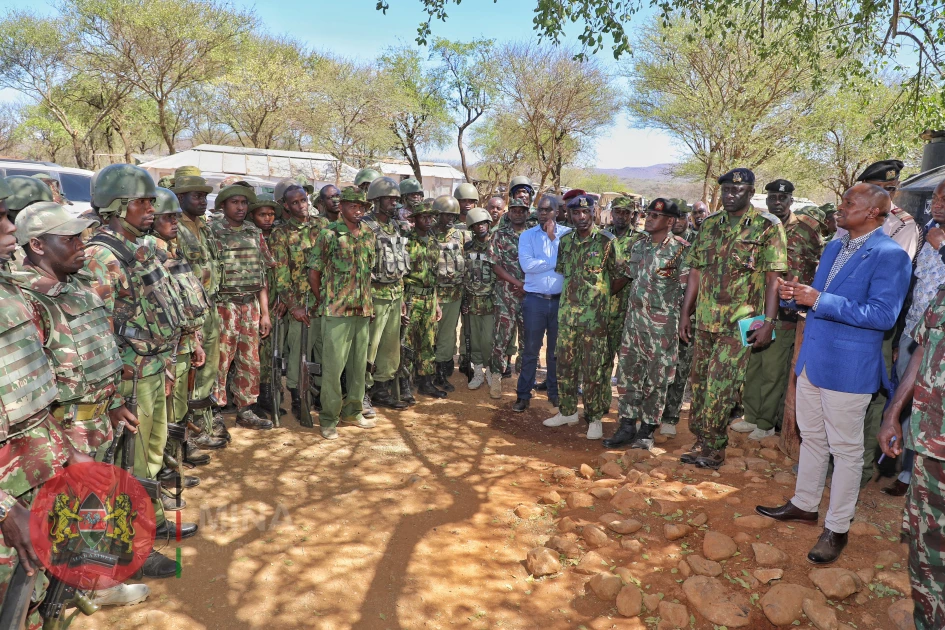OPINION: Need to remain vigilant as normalcy returns in the volatile North Rift

Interior CS Kithure Kindiki with security personnel in his visit to Baringo on Saturday, January 28, 2023. Photo/Ministry of Interior

Audio By Vocalize

The ongoing multi-agency security operation has resulted in incremental gains in the government’s efforts to end the problem in the region. Guns are gradually going silent, peace is being restored, schools are being rebuilt and displaced families are finding their way back home to their farms.
Authorities are alive to the fact that successful strategies for eliminating cattle rustling and banditry in the region require a multi-faceted approach that addresses the underlying causes and involves a wide range of stakeholders.
Traditional beliefs centered on cattle, economic marginalization, lack of government presence, commercialization of cattle rustling, political incitement and proliferation of illicit small arms and light weapons have been singled out as some of the main factors at the root of banditry and cattle rustling in the region.
Traditional practices like payment of dowry requiring cattle in large numbers, glorification of successful raids by warriors seen as heroes, possession of large herds of livestock, and blessings or cleansing of warriors by Laibons in a ceremony called ‘Sapanah’are some of the key culture elements exacerbating banditry and cattle rustling in the region.
Underdevelopment and perceived economic marginalization that has seen the area have inadequate basic infrastructure including a poor road network, non-operational medical facilities and other social amenities have also significantly contributed to the rampant rustling activities.
The absence or thin presence of National Government
Administration Officers (NGAO) has also been cited as one of the ingredients
fuelling banditry for it has created an ungoverned space causing endless
lawlessness.
Cattle rustling and banditry has been a historical burden that previous government regimes tried to solve unsuccessfully.
Will Kenya Kwanza succeed where all other regimes before it failed? Prof Kithure Kindiki, the soft-spoken Cabinet Secretary of the Interior Ministry seems to have discovered the magic bullet towards resolving some of the challenges mentioned above if recent successes are anything to go by.
Residents in the affected areas are hopeful that the continued relative calm currently being experienced, will be a permanent feature in their lives and that bandits and cattle rustlers will never thrive again.
In the past, several interventions including both hard and soft power approaches have taken place to disarm locals of illegal arms voluntarily or forcefully. In 1984 according to the Truth, Justice and Reconciliation Commission Report of 2013, there was Operation Nyundo military campaign against Pokots where the disarmament exercise resulted in deaths of civilians in what has come to be known as Lotiriri Massacre.
Despite the hard power approaches banditry and cattle rustling was not eliminated. Other operations to follow included 1997 Operation Steel Talon targeting North Rift region, 2014 Operation Okota Silaha Haramuin Samburu, 2021 Operation Rejesha Utulivu in Laikipia and 2022 Operation Pekua Pekuain Kerio Valley.
In all the operations
disarmament registered minimal success highlighting the essence of soft power
approaches as well.
The Kenya Kwanza government seeks to tackle the structural systemic issues contributing to the prevalence of banditry and cattle rustling in the region through incorporating community involvement to provide intelligence, deployment of specialized security units to track and neutralize the criminals, recruitment and training National Police Reservists to supplement police efforts, construction of cross-community schools and initiating cross-community development projects.
Such projects include roads, bridges, health centers, markets and water points that would help to connect communities and reduce the likelihood of conflicts over resources due to poverty and social inequalities that often contribute to insecurity.
County governments and religious institutions are also keen to play a pivotal role in the fight as Governors and Catholic bishops in the North Rift, recently launched a new peace initiative to completely wipe out banditry in affected counties and transform communities through shifting attitudes and perceptions.
As the government slowly works on winning the soul and minds of the locals, consciously all stakeholders must be aware that building trust takes time as communities already have a negative perception of the security operations and by extension the government.
The multiagency security operation team has done a commendable job so far, but the guns going silent may point to the enemy lying low and waiting for an opportune time to strike again. They must therefore remain vigilant and unwavering.


Leave a Comment